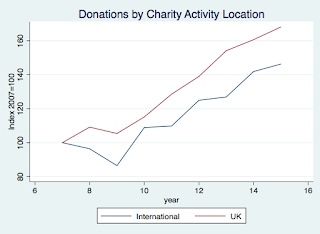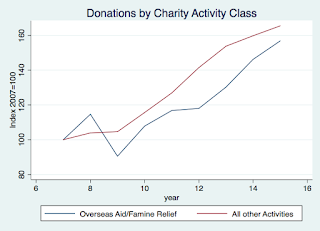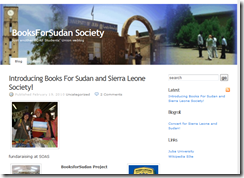

Probably the best economics blog (founded) in South Sudan


"Drawing upon the all-pay auction literature, we propose a model of charity competition in which informed giving alone can account for the significant quality heterogeneity across similar charities. Our analysis identifies a negative effect of competition and a positive effect of informed giving on the equilibrium quality of charity. In particular, we show that as the number of charities grows, so does the percentage of charity scams, approaching one in the limit. In light of this and other results, we discuss the need for regulating nonprofit entry and conduct as well as promoting informed giving."
Information, Competition, and the Quality of Charities, by Silvana Krasteva and Huseyin Yildirimb
It doesn’t at all, as far as I can tell. As Calum points out, what matters is the systematic review of evidence not one study. And the new Cochrane systematic review doesn’t seem to have responded to the criticism from Duflo et al to their 2012 review, that it ignores quasi-experimental and long-term evidence on positive impacts of deworming (specifically Bleakley 2004, Ozier, and Baird et al).
A replication of the famous Miguel and Kremer deworming paper that launched the whole RCT in development economics movement, is published in the Journal of International Epidemiology today (along with comment from Hicks, Kremer, and Miguel, and reply from the replication authors), with coverage in the Guardian and by Ben Goldacre for Buzzfeed.
You may remember Berk Ozler's review of the draft of the replication paper back in January - concluding
"Bottom line: Based on what I have seen in the reanalysis study by DAHH and the response by HKM, my view of the original study is more or less unchanged."
You can probably expect to see more on the replication coming from @cblatts, which I’m not going to get into, but back in 2012, Givewell were convinced that the Cochrane review shoudn’t change their recommendation to donate to the Schistosomiasis Control Initiative or Deworm the World.
The ambiguity does make me a little queasy, and pushes me more in the direction of GiveDirectly (I see basically zero risk that giving $1000 to someone on a very low income can really be totally wasted, in the way that an ineffective drug could theoretically have zero impact).
Some interesting ideas from Alex Evans about the importance of building a movement
"Rich and I set out the need for a different theory of influence. Many of us who work in the fight for development, justice, and sustainability have I think been feeling the limits of theories of change that rely primarily on ‘insider lobbying’. We take that here as our starting point for asking what an alternative approach might look like: one that places much more emphasis on how we build new grassroots coalitions, transform values, and tell each other much deeper stories about where we are, how we got here, where we might choose to go next, and who we really are."
and then what those movements should do
We argue that it starts with the changes that all of us need to make in our own lives. This is partly because of the direct impact that such changes can have, of course, but we think the main issue here is something to do with the quality of intention that movements exemplify. Wherever movements not only demand but live out the change they want to see in the world, there’s a raw power there that can exert the kind of non-linear effect on politics that progressives so urgently want to see.
and from the full report
In practice, we think there are five areas that each of us needs to think about, which we describe in more detail below:
1. Live within our fair share of the world’s resources and environmental limits
2. Respond to poverty and inequality with radical generosity
3. Speak out prophetically
4. Use our power as a voter, a citizen and a consumer
5. Live restoratively and prioritise relationships
All of this is in a report for Christian Aid and supported by references to the bible rather than econ journals. Personally I’ve shifted somewhat from a Dawkins atheist to a de Botton atheist, and think there are important lessons here too for emerging secular congregations.
Our distaste for money-talk in everyday social life is well established: you never ask what someone earns, or disclose your own income; you never ask what price someone paid for anything, nor do you announce the cost of any of your own possessions. In social contexts, there is a sort of ‘internal logic’ to the money-talk taboo, in that it can be explained, to some extent, with reference to other basic ‘rules of Englishness’ to do with modesty, privacy, polite egalitarianism and other forms of hypocrisy.But at the same time it is kind of nuts that there are such good giving opportunities out there to make the world a better place and we're not allowed to talk about them. In the UK only 39 percent of people give more than fifty pounds a year to charity (NPC 2013). Of those, the average amount for "mainstream" donors is £303 a year, for high-income donors £1,282 a year. Meanwhile, you could be saving a child's life for as little as £1500.
There are pockets of stronger resistance to the money-talk taboo, particularly in Yorkshire, a county that prides itself on being forthright, blunt and plain-spoken, especially on matters that mincing, hesitant southerners find embarrassing, such as money.Also it's much easier to type things into the internet ether than to actually say them to people in person. So consider this an annoying reprimand. We have the tools. We have efficient, low overhead, transparent, charities that have proven impact on poverty and child health. Excuses about waste and corruption just don't cut it any more. Aren't you going to recycle that?
our positive view on LLINs remains in place. There is strong evidence that LLINs reduce malaria and save lives and only preliminary/suggestive/mixed evidence that insecticide resistance may reduce their impact. In addition, it appears to us that the malaria control community has been devoting at least some attention and investigation to this issue for a long time, has developed a reasonable knowledge base (if one that has plenty of room to grow), and still recommends the use of LLINs regardless of the resistance situation.
Indeed, the fact that we’re discussing this issue at all speaks to the extraordinarily and unusually strong evidence base (and supply of data) behind ITN distribution. For most aid interventions that donors can fund, the set of “things that could go wrong” is large and broad, and we have little evidence to address most of them, but when looking at LLIN distribution, the salient concerns are few and specific enough that the malaria control community is able to put substantial resources into specifically investigating them.And AMF:
Currently both issues - resistance to pyrethroids and changed time of biting - are not widespread. Currently LLINs remain highly effective in reducing the incidence of malaria.And why not, here's the Donation Page.
Recently the figures for saving the life from people who are suffering from tuberculosis through the DOTS program was around about $250 for saving a life. And on that figure the average person living in the U.K. - so a medium income earner in the U.K. could if they wished with their salary while still living a reasonable life certainly by world standards, could save more than a thousand lives from tuberculosis.
And so more than 50% of the population of Britain could save actually more than 1,200 lives, which is the number I picked because it is the number of lives Oskar Schindler saved in World War II and is generally thought to be a very heroic person in the time of heroes and villains where there were terrible things going on, but also amazing opportunities for heroism. And it’s very interesting to see that actually most people on the street could achieve that level of benefit for other people
...
Why isn’t there a big public discussion about the fact that we all could do as much good as Oskar Schindler and yet we tend not to?Toby Ord speaking to Owen Barder.
the policy-induced portion of the place premium in wages represents one of the largest remaining price distortions in any global market; is much larger than wage discrimination in spatially integrated markets; and makes labor mobility capable of reducing households’ poverty at the margin by much more than any known in situ intervention (Clemens, Montenegro and Pritchett).People worry about the ethical implications of randomly allocating treatments in small research projects. Yet when people are randomly born in hopeless economies with tyrannical rulers, we do everything we can to prevent them escaping.
The world’s poorest do not communicate with us, which causes us to give less to them than we otherwise would. By contrast, we are bombarded with messages from the well-off, which - on its own - tends to dispose us to be altruistic towards them.and
there are huge costs to being out of sight. Whether it be benefit claimants in the UK or the poor overseas, the mere fact of being anonymous means people are meaner towards you.And so the challenge: if we want to increase altruism towards the world’s poor, how to create a space for communication between them and the citizens of rich countries? Poverty porn? Slum tourism? Fasting? How do we create this engagement whilst respecting the dignity of all involved?

This looks like a great project. There is a container at the School of Oriental and African Studies in London waiting to be filled with academic books for Juba University. Get down there if you have any and you are based in London; the deadline is the end of March.
More generally - many forms of aid seem to run into bottlenecks - for instance millennium villages might be wonderful but the well trained and motivated implementers can’t easily be scaled up to a national level.
Giving books to university libraries seems pretty scalable to me.
"Jacari is a student-run charity providing home teaching for children living in Oxford. These children, who are between 4 and 16 years old, do not speak English as their first language and often come from refugee families and those seeking asylum. University students volunteer to help improve their allotted child's English and performance in other subjects as required."I spent an hour a week for about 3 months reading with a kid and helping him with his maths homework. The improvement in his ability and enthusiasm for reading was noticeable every week.